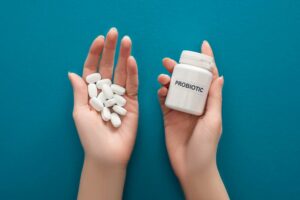New research in JAMA Psychiatry suggests that probiotics, commonly championed for their digestive benefits, might be a valuable tool in reducing the symptoms associated with Major Depressive Disorder (MDD).
This study, led by Viktoriya L. Nikolova from King’s College London, focused on participants whose depressive symptoms remained unmitigated despite antidepressant treatment, a situation referred to as an “incomplete response.” Results revealed a notable reduction in depressive and anxiety symptoms when probiotics were administered in conjunction with their antidepressants. The authors state:
“The acceptability, tolerability, and estimated effect sizes on key clinical outcomes are promising and encourage further investigation of probiotics as an add-on treatment for people with MDD in a definitive efficacy trial.”

This research aimed to investigate whether pairing probiotics with antidepressants could alleviate symptoms of depression and anxiety. Forty-nine participants aged 18 to 55 were recruited from London for the randomized clinical trial. These individuals were currently on antidepressants, but their depressive symptoms remained inadequately controlled. To measure the severity of depressive and anxiety symptoms, researchers used the Hamilton Depression Rating Scale (HAMD-17), the Inventory of Depressive Symptomatology (IDS), the Hamilton Anxiety Rating Scale (HAMA), and General Anxiety Disorder scores (GAD-7).
The trial consisted of two groups, containing 24 and 25 participants. One group was given probiotic treatment, while the other received a placebo. The allocation was double-blind, ensuring neither researchers nor participants knew who was receiving probiotics and who was given a placebo. Participants provided their responses on the various rating scales before the probiotic intervention and then again at 4 and 8 weeks post-intervention.
Only minor, transient gastrointestinal issues were reported as side effects among the probiotic group, underscoring the tolerability of the intervention. According to the authors, this lack of adverse effects kept the blinding intact, meaning the participants and researchers remained unsure of who was given the probiotics and who was given a placebo throughout the life of the study.
Improvements in symptoms were observed across both the probiotic and placebo groups throughout the study. However, the probiotic group demonstrated more significant strides in symptom reduction.
At the 4-week mark, the probiotic group averaged scores of 11 (HAMD-17), 30.17 (IDS), 11.71 (HAMA), and 7.78 (GAD-7) compared to 14.04, 33.82, 14.70, and 10.91 in the control group. At eight weeks, the probiotic group averaged scores of 8.83 (HAMD-17), 25.04 (IDS), 8.17 (HAMA), and 7.63 (GAD-7) compared to 11.09, 29.64, 10.95, and 9.48 in the control group.
At four weeks, 4 participants from the probiotic group were “very much improved” compared to 0 from the placebo group. Five from the probiotic group were “much improved” compared to 4 from the placebo group. Eleven from the probiotic group were “minimally improved” compared to 5 from the placebo group. Four from the probiotic group had “no change” in their symptoms compared to 14 from the placebo group.
At eight weeks, 5 participants from the probiotic group were “very much improved” compared to 0 from the placebo group. Eight from each group were “much improved.” Nine from each group were “minimally improved.” 2 from the probiotic group saw “no change” in their symptoms compared to 5 from the placebo group.
Significantly, the authors reported a robust association between the assigned group and reduced scores on the HAMD-17 scale at week four and the IDS scale at week 8. Reductions in anxiety symptoms, as measured by the HAMA scale, were also associated with the probiotic group at 4- and 8-week intervals.
The study found that probiotics were especially effective in mitigating anxious and somatic symptoms, which typically resist treatment by antidepressants. However, the researchers noted the need for caution given several limitations in their study. The study’s demographic was predominantly white and exclusively from London, limiting the generalizability of results. Additionally, the precise adherence to the treatment was hard to quantify accurately.
Despite these limitations, the authors concluded on an optimistic note:
“The probiotic was well tolerated, with a low attrition rate, high adherence rate, and no serious adverse reactions. This safety and acceptability profile is better than those reported in earlier studies using different supplements.2,3 Given the range of supplements available, clinical decisions should be guided not only by indicators of efficacy but also by safety and acceptability.”
Previous research has highlighted the positive effects of probiotics on stress symptoms in mice and suggested potential benefits for symptoms of mania in individuals with bipolar disorder. Additionally, probiotics have been associated with reductions in anxiety and depression in past studies.
Contrastingly, antidepressants have been shown to be no more effective than placebos for 85% of patients, questioning their long-term utility. Other studies have suggested that these medications are “largely ineffective and potentially harmful,” failing to enhance the quality of life, with minimal benefits against significant risks.
****
Nikolova, V. L., Cleare, A. J., Young, A. H., & Stone, J. M. (2023). Acceptability, tolerability, and estimates of putative treatment effects of probiotics as adjunctive treatment in patients with depression. JAMA Psychiatry. https://doi.org/10.1001/jamapsychiatry.2023.1817 (Link)
Editor’s Note: Part of MITUK’s core mission is to present a scientific critique of the existing paradigm of care. Each week we will be republishing Mad in America’s latest blog on the evidence supporting the need for radical change.
